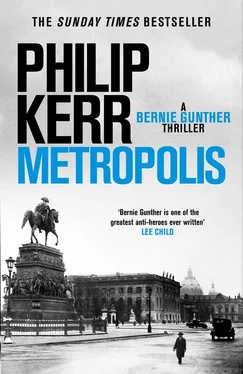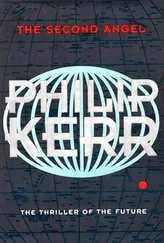‘So what are you saying? That I shouldn’t write this movie?’
‘No, I’m not saying that at all. I’m saying why take the risk of choosing a murderer who preys on people who are already perceived by some to be part of the problem? Why not choose another sort of killer? Another kind of victim. For maximum sympathy. The kind of victim no one could argue with.’
‘Like who?’
‘I don’t know. I’m a cop, not a writer. But if you were to choose a killer who preys on children, perhaps, then there’s no one who could ever suggest that they deserved it, that they were courting disaster. Everyone likes children. Even Gennat.’
‘A child murderer.’ Thea’s eyes widened. ‘That is something new. But it might be too much. Could people stand a film like that?’
‘Make them stand it.’ I lifted my glass, leaned back in my chair, and watched Thyssen screw a cigarette into a gold holder; vulgarly I wondered how much he was worth and what kind of house he was going home to. I expect he was looking at me and doing the same.
‘But there’s another reason why I’m saying this. If you’re writing about a child murderer, then your screen killer will look very different from Winnetou. This helps put a bit of distance between Bernhard Weiss and your husband.’
‘And that’s important? Why? Because they’re both Jews, I suppose.’
‘Because they’re both Jews. The Nazis love to see conspiracies where none exist. So let’s give them as little ammunition as possible. And by the way, this is Weiss’s thinking, not mine. I’m just a detective.’
She gave me a ride home in her car. When I got inside the house on Nollendorfplatz, I found Rankin had turned up safe and sound. He’d been on a bender with some old friends who were over from England and had stayed in the house they’d rented over in Schmargendorf.
‘I’m sorry but it simply didn’t occur to me that any of you would worry,’ he said.
‘That’s all right,’ I said. ‘We’ll know the next time that you’re probably all right. Won’t we, Frau Weitendorf?’
‘Well, I think you’ve been very selfish,’ she said. ‘Fraulein Braun and I thought something dreadful must have happened to you, Herr Rankin. All those broken records on the floor of your room. And the empty bottles of whisky. What were we supposed to think? Even Herr Gunther was concerned about you.’
‘It’s true, I drink too much sometimes. And when I do I get very strong opinions about music. I should never have bought those records. You might say they were a sort of failed experiment in taste. The fact is, I much prefer Wagner and Schubert.’
‘That is no excuse,’ said Frau Weitendorf, and waddled off irritably.
‘I think she’d almost have preferred it if you were dead,’ I said.
‘I think you’re right. But she’ll come around. They always do. I’ll give her a bit extra for cleaning the room and she’ll be fine.’ Rankin grinned at me sheepishly. ‘Women, eh? Can’t live with them, can’t live without them.’
I thought about my pleasant evening with Thea von Harbou and reflected that possibly her husband felt exactly the same way as Rankin. My own opinion of women wasn’t in the least bit equivocal: Living without my own wife was much less preferable than living with her. In fact, there were times when it was nothing short of intolerable. If women were good for one thing it was this: that they take the sharp edge off feeling forever like a man.
Deep below the earth’s surface lay the workers’ city.
— Metropolis, directed by Fritz Lang from a screenplay by Thea von Harbou
Berlin’s summer finally arrived in earnest and the city bloomed with light and shrugged off its greasy loden overcoat. Lovers sat on five-penny benches in the Tiergarten not far from Apollo, who stared at his stringless stone lyre and wondered impotently what to play for them. On Sundays, workers in their thousands took an S-Bahn train to the white sandy beaches of Wannsee. One day I went myself and you couldn’t see the beach for the people, so that it was hard to make out where the sand ended and the water began; they paddled their dirty feet in the warm shallow water before returning home to the grey eastern slums, their faces pink from the sun, their sweating bellies full of sausage and sauerkraut and beer. Pleasure steamers headed noisily down the Spree to Grünau and Heidesee, and the statue of Victoria at the top of Berlin’s victory column blazed in the bright sunlight like a fiery angel as if it had come to announce some new apocalypse.
At the Alex, we paid lip service to summer by calling in the painters and plasterers, by hosing down the basement cells and leaving the upper-floor windows ajar all day, allowing the air to blow away some of the gloom and the stink of tobacco smoke and perspiration. But it never lasted very long. A cage is still a cage however wide open you leave the doors, and it always stinks of the animals who’ve been kept there: murderers, thieves, gartersnappers, queers, grasshoppers, control girls, drug addicts, alcoholics, wife beaters and gangsters. But mostly just cops. No one smells worse than us.
There’s something about a big Police Praesidium on a broiling summer’s night; it’s easy to think that crime kicks off its tight shoes and takes a holiday like the rest of Berlin, but that would be a mistake. It’s never the cold that brings out the worst in people, it’s the heat. If you can call them people: the sick, venal, lowlife that lies oozing at the bottom of the strata we are wont to call Berlin society. Sometimes I had the strong idea that George Grosz was right and I was wrong; that he was only recording what was already there: the indifferent fat bankers, the crippled veterans, the mutilated beggars and the dead prostitutes — that this was how we really were, ugly and obscene, hypocritical and callous.
But there’s always something new in this job that surprises you. Something that throws you off guard, such as the kind of murder you never expected to see because naïvely you thought you’d seen everything. That’s what happened in the long hot summer of 1928.
It was on a day when public interest in Winnetou was at its highest that everything changed abruptly and, almost overnight, a very different sort of killer took his place in the febrile imagination of the metropolis. One moment the Kripo’s Murder Commission was investigating Eva Angerstein’s killing, and the next it seemed as if she and Winnetou’s other unfortunate victims had never existed. For a while I tried to keep a discreet handle on the case but it was to no avail. The orders came from the very top.
One day Bernhard Weiss found himself summoned to a meeting at the Ministry of Justice on the Wilhelmstrasse, where he was told, in no uncertain terms, that the Murder Commission was to lay off the Winnetou murders and devote all its energies to catching the man the press had dubbed ‘Dr Gnadenschuss’, which was how he had represented himself in the letter he’d sent to all the city’s newspapers. In it, he had claimed responsibility for these latest murders while also mocking the Berlin police and, in particular, the Murder Commission. And since those present at the meeting included the minister of justice, Hermann Schmidt; the minister of the interior, Albert Grzesinski; and the ViPoPra, Karl Zörgiebel, Weiss had little choice but to bite his lip and comply with his orders. It was as if someone had overheard my conversation at dinner with Thea von Harbou. The word from the Wilhelmstrasse was that almost nobody in government gave a damn about a few dead grasshoppers — not when there was a killer at large deemed to be of much greater political importance. Our government and politicians had deemed what Dr Gnadenschuss was doing to be a disgrace to the Republic, and catching him was now to be the Murder Commission’s top priority. Meanwhile, Police Colonel Magnus Heimannsberg, who was also briefed in the same meeting, had his uniformed boys in Schupo advise Berlin’s prostitutes to stay off the streets or to sell it at their own risk.
Читать дальше












